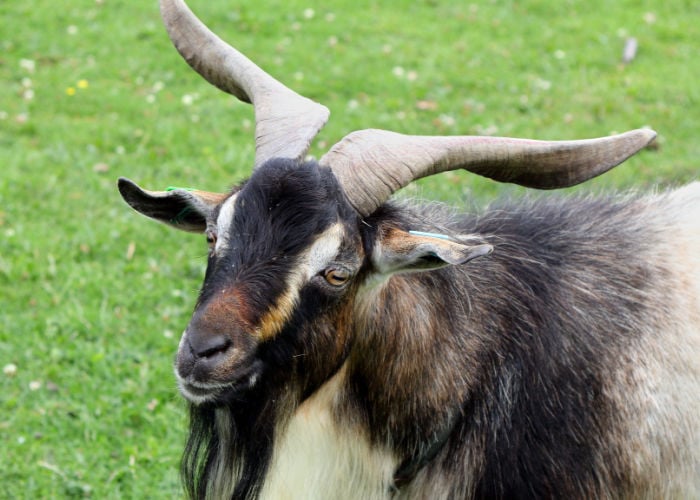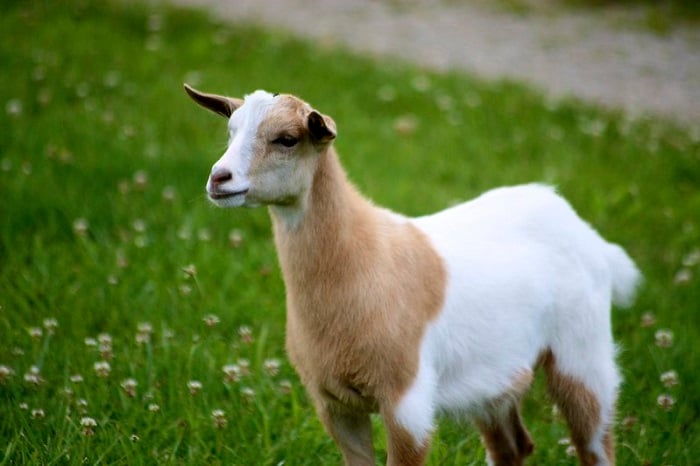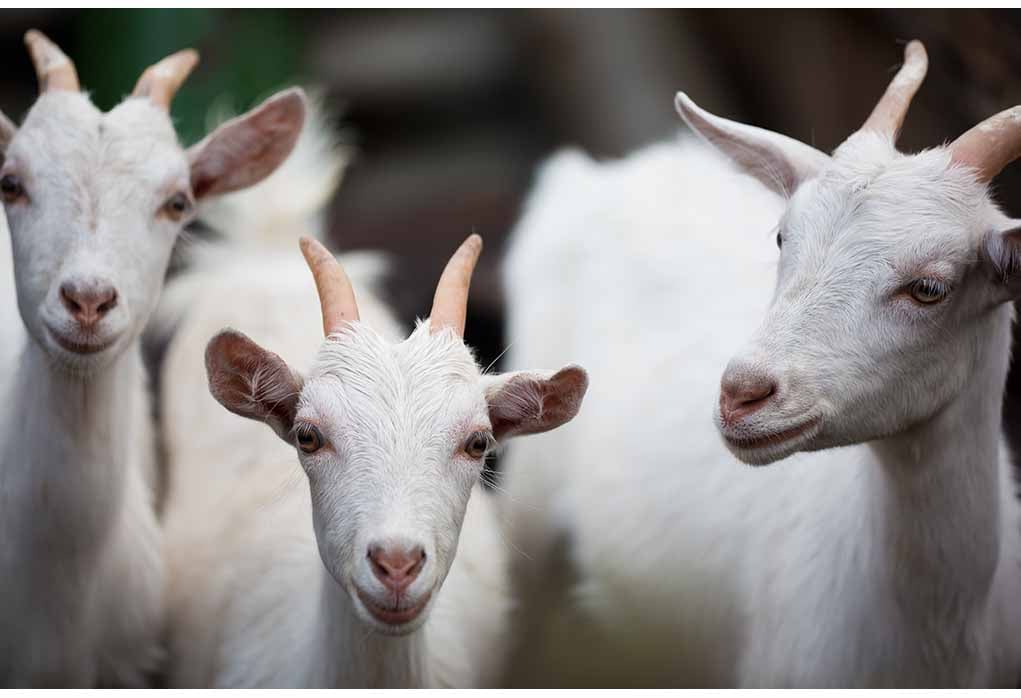When you think of goats, what comes to mind?
Perhaps you picture a cute and cuddly animal, or maybe you think about their milk or meat.
But for me, the first thing that comes to mind is the Arapawa goat – a breed that is sassy, defiant, and friendly all at the same time!
Arapawa goats are known for their intriguing demeanor and distinctive appearance.
These goats originate from Arapawa Island, which is a remote island located in the Marlborough Sounds of New Zealand.
In this blog post, we will delve into the characteristics that make Arapawa goats stand out from other breeds and why they areworth adding to your farm.
What Are Arapawa Goats?
The Arapawa goat is one of the few survivors ofOld English milch (milk) goats, which is now extinct in native England.
In the 1800s, goats were imported to Arapawa Island, located in the Marlborough Sounds, South Island of New Zealand.
The goats were left to forage on their own, eventually creating their unique characteristics.
Due to their small population, they nearly became extinct but were saved by aconservation program.
History of the Arapawa Goat Breed
If you like a good underdog story like I do, you’ll love learning more about the Arapawa goat breed.
The Arapawa goat breed is not native to Arapawa Island, but they’ve been there for over 150 years.
The first European settlers established a shore whaling station on the island, and goats were recorded at the station in 1839.
It was originally thought that the goats were descendants of those released byCapt. James Cookin the 18th century, but further research has debunked that theory.
Regardless of their origin, the goats were left on the island to breed and became key sources of food and milk for the settlers.
For hundreds of years, the population flourished without major threats.
但这改变the 1970s when theNew Zealand Forest Servicehad enough.
They decided that the goats were being destructive, and this warranted their removal.
At this point, the future of the breed was in question, but thanks to some savvy conservationists, this problem was (thankfully) avoided, and the breed was not totally exterminated.
EnterBettyand Walt Rowe, two island residents who weren’t going to let the goats go quietly into the night.
In 1987, they and a group of volunteers established a sanctuary for the breed and began conservation work.
They domesticated 40 goats, and through their dedication, the Arapawa goat breed gained immense popularity.
How Many Arapawa Goats Are There in the World?
Today, there are around 600 wild Arapawa goats living on the island.
But what about the Arapawa goats that have been domesticated?
Unfortunately, the numbers here are unclear.
In the United States, there are believed to be around 200 Arapawa goats that have been domesticated.
However, this number constantly changes as more people become interested in this rare breed.
As for the UK and New Zealand, it’s difficult to say how many there are.
Some estimates suggest there may be a few hundred in both countries.
Ultimately, it’s important to recognize that the Arapawa goat breed isone of the rarest in the world, and it needs to be cherished as a valuable ecological asset.

What Do Arapawa Goats Look Like?
Arapawa goats are medium-weight goats.
Does tip the scales at around60 to 80 lbs.and bucks weighup to 125 lbs.
But their size is just the beginning of their distinctive features.
One thing that immediately stands out with Arapawa goats is theirlong hair.
Their hair is thick and lustrous, often becoming thicker at the top of the legs and spine.
During winter, they grow a thick undercoat for insulation.
Arapawa goats are generally black, brown, and white color combos, with many also possessing distinct facial stripes.
These stripes give them a unique and captivating appearance that sets them apart from other goat breeds.
Females are slimmer compared to males, while males are stockier with a round belly.
Their faces are straight or sometimes a bit concave.
The ears have a little bit of a crimp to them, an adorable feature that makes it look like they’re tipped to eye level.
The horns curve back with a twist out, with the males’ horns being thicker, outward-sweeping, and flatter.
Both males and females can grow thick beards, but males tend to have longer beards.
Interestingly, Arapawa goats do not have wattles.
Behavioral Characteristics of Arapawa Goats
This breed is known for being non-aggressive and friendly, especially if they are handled early on in their life.
They can make excellentfamily goatsand are even good with children.
They tend to get attached to family groups and love being with other goats as well, meaning they’re a good option for existing herds.
However, one thing to keep in mind is that Arapawa goats are true escape artists.
They can squeeze through very small spaces and jump higher than you might expect.
This means that appropriatefencingis an absolute must-have.
If you’re not careful, they’ll be out exploring the neighborhood in no time.
Another thing to note is that Arapawa goats don’t particularly enjoy being out in rainy or overlycold weather.
So, providing them with a shelter where they can stay dry and comfortable is essential.
They also are great at clearing unwanted vegetation and weeds, making them an excellent choice for landowners looking to keep their property in check.
When it comes to health, Arapawa goats are generally hardy and self-sufficient in their native terrain.
However, does make excellent mothers, and care must be taken to ensure they receive proper nutrition and healthcare.
They are also well-adjusted to cold temperatures, which is good news for goat owners in colder climates.
Lastly, Arapawa goats are a valuable genetic resource and are worth maintaining as such.
They are alert and skittish but can become friendly and make excellentfamily goatsif handled gently in early life.
They are active and enjoy roaming around to find food, so providing them with opportunities to exercise is a must.
What Are Arapawa Goats Used For?
让我们开始与名人的最明显的原因e keep goats – dairy.
Dairy goatsare some of the friendliest animals on the planet, and Arapawas are no different.
They may not be the top producers, but they do provide sufficient milk for a family’s consumption.
Their milk can be used for cheese-making or other dairy products, or it can be consumed as is.
Plus, their milk has a relatively high-fat content compared to other breeds, which makes it perfect for those who love rich and creamy milk.
Are you a fan ofgoat meat? Look no further than Arapawa goats.
They are naturally leaner and smaller than other breeds, meaning their meat is very tender, and their flavor is unique.
You can choose to raise them solely for meat or add them to your herd for an added protein source.
They don’t take much space and can easily be transported, making them perfect for small-sized farms.
Arapawa goats also have somefiber value, making them useful for wool production.
Their coarse, colored wool can be used for weaving, felting, or other wool crafts.
The fiber they produce is durable and eco-friendly and cements them as a multi-purpose goat breed.
Who wouldn’t want an animal that can serve as meat, dairy, and fiber goat in one?
Breeding Arapawa Goats
One of the most notable features of Arapawas is theirability to breedin all seasons.
This means that farmers can plan their herd management year-round without worrying about any seasonal gaps or downtime.
And when it comes to breeding,twin birthsare a common occurrence with Arapawas.
This makes them a highly efficient choice for those who want to build up their herd quickly.

Tips for Raising Arapawa Goats
Ready to start raising these curious and boisterous creatures?
Here are666beplay .
1. Give Them Ample Space
First and foremost, let’s talk about space.
Your Arapawa goats will need ample space to roam around and get their daily exercise.
A500-square-foot area per goatis an absolute minimum.
But if you want your goats to be happy and healthy, give them one acre each.
2. What to Feed
Feedingis another crucial factor.
Arapawa goats are hearty eaters and require a balanced diet that includes hay, grains, and freshwater.
Keep in mind that these goats love to nibble, so make sure to have plenty of grass and weeds available to them.
Keep their meals regular and consistent, and you’ll have happy, healthy goats.
3. Spend Time With Your Goats
Arapawa goats are known for having strong personalities and being quite independent.
So it’s essential to establish a positive relationship with them from an early age.
Spend time with your goats; talk to them, pet them, and give them your love.
It’s also crucial to have strong, confident body language around them.
他们会信任你更多如果你公司和consistent.
4. Watch for Parasites
One of the biggest issues to keep an eye out for with Arapawa goats isinternal parasites.
These goats are naturally more resistant to external parasites like fleas and ticks, but internal parasites such as worms can wreak havoc on their health.
Make sure to schedule regular check-ups with your local veterinarian and deworm your goats as necessary.
5. Be Mindful of Your Breeding Stock
Inbreeding is common in the Arapawa goat breed.
This means that it’s crucial to carefully select your initial breeding stock and practice thoughtful breeding.
Be sure to choose animals with good genetics and avoid breeding related individuals.
Over time, you may need to bring in new blood from other Arapawa herds or even crossbreeds to maintain healthy genetic diversity.
Are Arapawa Goats Right For You?
Arapawa goats are tough as nails.
They can navigate steep terrain and rough weather with ease, making them a great addition to your farm if you live in a harsh environment.
Raising these goats can be an adventure, but it’s not for the faint-hearted.
They are known for their skittish behavior and can be difficult to handle, especially since they have a reputation for being “escape artists.”
If you’re looking for a low-maintenance animal, Arapawa goats may not be the right fit for you.
That said, there are definitely some benefits to raising Arapawa goats.
They’re excellent foragers and can help keep your property tidy byeating weeds and brush.
They’re also great milk producers, and their milk is said to have a unique, tangy flavor.
In terms of overall health, Arapawa goats are relatively disease-resistant and require minimal veterinary care.
FAQs about Arapawa Goats
What is the lifespan of an Arapawa goat?
The lifespan of an Arapawa goat is typically between 10 and 12 years, although some goats may live longer with proper care and nutrition.
What are some common health issues that affect Arapawa goats?
Arapawa goats are generally hardy and resistant to many common goat diseases, but they may be susceptible to parasites, foot rot, and other health issues if they are not provided with proper care and nutrition.
What is the average price of an Arapawa goat?
The average price of an Arapawa goat varies depending on the age, sex, and breeding of the goat, as well as the location and availability of the breed.
However, prices typically range from a few hundred to a few thousand dollars per goat.
Are Arapawa goats suitable for meat or dairy production?
Arapawa goats are not typically used for commercial meat or dairy production, as they are a relatively small breed and do not produce as much milk or meat as other goat breeds.
However, they may be used for small-scale meat or dairy production, as well as for brush clearing or as pets.
Arapawa Goats: Final Thoughts
Arapawa goats are a delightful and unique breed that is worth getting to know and raising.
With their sassy, defiant, and friendly personalities, striking appearance, and versatility, they offer many benefits for farmers and hobbyists alike.
Whether you are looking for a new pet, a breeding opportunity, or a source of milk or meat, Arapawa goats can deliver.
So why not add them to your farm today and experience their charm for yourself?



